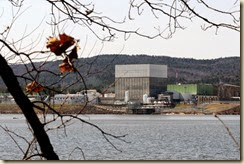 Vermont Yankee is a relatively small nuclear facility in a relatively small state. Its closure later this year will cause Vermont to import more electricity, but what happens in Vermont does not impact Vermont alone.
Vermont Yankee is a relatively small nuclear facility in a relatively small state. Its closure later this year will cause Vermont to import more electricity, but what happens in Vermont does not impact Vermont alone. That’s important and this week, NEI will put up a set of Web pages that zero in on the implications of shuttering a nuclear reactor. The articles are grouped under the title “Closing Vermont Yankee” and covers the electricity markets, the possibility of an energy crisis in New England and the efforts to reduce carbon dioxide emissions in the region and country. And Vermont Yankee has an important role in all three topics.
The first article, available today, focuses on the electricity marketplace. The polar vortex showed the importance of nuclear plants to provide reliable energy (notably in New England) and the coming EPA carbon dioxide emissions rule makes manifest the value of clean nuclear facilities. In the article, industry executives warn that more nuclear plants are under financial strain and could close—a prospect that should alarm everyone who cares about the nation’s energy security and electric grid reliability.
Tomorrow, the focus will be on reliability. Closing Vermont Yankee will exacerbate instabilities in the energy markets of a region already roiled by uncertainties in that sector. Writing to Maine’s congressional representatives in September on the need for new natural gas pipelines in the region, Gov. Paul LePage said, “New England is in an energy crisis.”
Wednesday, the subject is greenhouse gases and what closing Vermont Yankee means for the Regional Greenhouse Gas Initiative, which includes Vermont in its cap-and-trade system, and the upcoming EPA regulations limiting carbon dioxide emissions in the electricity sector.
And we’ll be participating in this project here on the blog, too. American Nuclear Society blogger and Vermont resident Meredith Angwin will offer a post later this week on the financial and human impact closing Vermont Yankee will have on the local community and on the state. It’s important to see the big picture, but we also want to keep a focus on Vermont and what losing an economic engine can mean to people in the most direct ways possible. Stay tuned for Ms. Angwin’s contribution later this week.
Comments